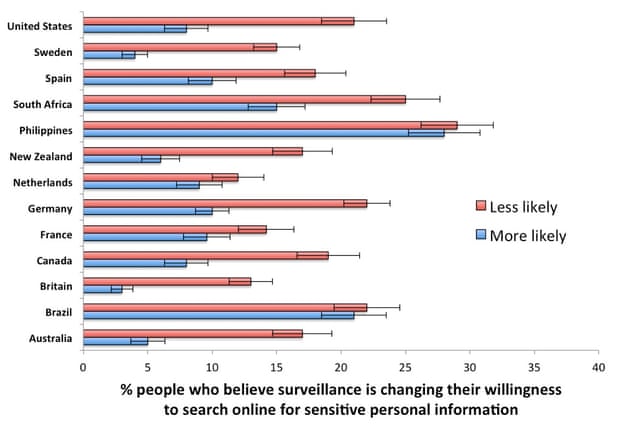How Surveillance Stifles Dissent on the Internet
New research shows that social-media users who said they have “nothing to hide” from the government often avoid posting controversial opinions on Facebook.
Kaveh Waddell | April 5, 2016
That’s according to new research from Elizabeth Stoycheff, a journalism professor at Wayne State University. Last week, Stoycheff published a study in Journalism & Mass Communication Quarterly examining whether users would behave differently on social media if they were primed to think about government surveillance first.
 |
| The psychology of mass government surveillance: How do the public respond and is it changing our behaviour? A poll in 13 countries by Amnesty International reveals how most people oppose surveillance of citizens but are less concerned about the targeting of foreign nationals. Knowing we are being watched may also be restricting our use of the Internet to obtain health advice. (March 18, 2015) Source: https://www.theguardian.com/science/head-quarters/2015/mar/18/the-psychology-of-mass-government-surveillance-how-do-the-public-respond-and-is-it-changing-our-behaviour |
<more at http://www.theatlantic.com/technology/archive/2016/04/how-surveillance-mutes-dissent-on-the-internet/476955/; related links and articles: http://motherboard.vice.com/read/chilling-effect-of-mass-surveillance-is-silencing-dissent-online-study-says (‘Chilling Effect’ of Mass Surveillance Is Silencing Dissent Online, Study Says. March 17, 2016) and http://m.jmq.sagepub.com/content/early/2016/02/25/1077699016630255.full.pdf (Under Surveillance: Examining Facebook’s Spiral of Silence Effects in the Wake of NSA Internet Monitoring. Elizabeth Stoycheff. Journalism & Mass Communication Quarterly. DOI: 10.1177/1077699016630255. [Abstract: Since Edward Snowden exposed the National Security Agency’s use of controversial online surveillance programs in 2013, there has been widespread speculation about the potentially deleterious effects of online government monitoring. This study explores how perceptions and justification of surveillance practices may create a chilling effect on democratic discourse by stifling the expression of minority political views. Using a spiral of silence theoretical framework, knowing one is subject to surveillance and accepting such surveillance as necessary act as moderating agents in the relationship between one’s perceived climate of opinion and willingness to voice opinions online. Theoretical and normative implications are discussed.])>

No comments:
Post a Comment